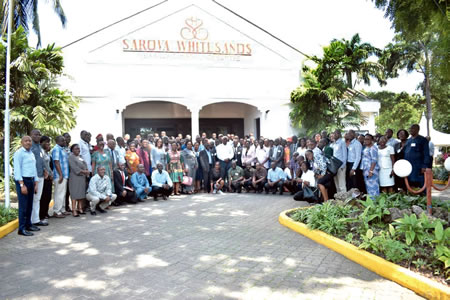
The Executive Director of Partnership for African Social and Governance Research (PASGR), Nairobi Kenya, Professor Tade Akin Aina, says the world is entering into a knowledge economy that is evidence-based, developed and generated through protocols and processes either in the humanities, sciences or technology.
He stated this on Monday in his opening remarks at the opening of the maiden edition of Pedagogical Leadership in Africa (PedaL) Annual Convening and Collaborative Master of Research and Public Policy (MRPP) Week organised by PASGR and supported by the UK Department For International Department (DFID) under the Strategic Partnerships for Higher Education Innovation and Reform (SPHEIR), held at the Sarova Whitesands Hotel, Mombasa, Kenya.
While noting that the world is at the verge of the fourth industrial revolution, Professor Aina emphasised the need for legitimate producers of knowledge to be adequately equipped and look into correction mechanisms, especially at the university level, in order to be able to fit into the revolution.
He charged the facilitators drawn from 21 universities in Africa at the event to embrace innovations in teaching and learning, saying that “for students to learn effectively, they must have exceptional and memorable moments. They need an array of different ways of learning and teaching and an assortment of variety, which include e-cases, role playing, role acting, dialogue, group work and so forth.”
Speaking on the rationale of the joint annual convening, the director, Higher Education Programme, PASGR and PedaL’s team leader, Dr Beatrice Muganda, said it was an avenue for university teaching staff to share experiences, impact stories, consult peers, validate and track progress made in translating the PedaL training into pedagogical innovations in their classrooms.
At the end of the week-long event, she said participants would showcase their achievements, prospects, and challenges through e-portfolios and reflect on their individual pedagogical journeys.
Mrs. Muganda added that the MRPP Week was deliberately planned to coincide with the PedaL annual convening to consolidate gains made in innovating in delivery of the signature programme and also for the MRPP to celebrate landmark achievements following the four years of implementation in 13 universities in seven African countries.
“The joint events will share programme outcomes with government officials, university leaders; policy actors from education and research communities; the media; development partners; and university teaching staff and students across the continent. The aim is to secure broad-based ownership and build momentum for replication of the innovations towards creating greater impact,” Dr. Muganda said.
Former Permanent Secretary, Ministry of Higher Education, Professor Crispus Kiamba, while delivering the keynote lecture on the topic: ‘Innovation in Higher Education: Prospects for African Universities’ said in order for African universities to educate learners for the fourth and future industrial revolutions, there is the need to embrace technologies associated with them.
He said there is also the need to make education systems, programmes and curricula flexible, allowing for students’ interests and needs, while teachers, who are primary facilitators of learning, should also be continuously learning so they can acquire the necessary skills and competencies.
Professor Bonaventure Rutinwa, deputy vice-chancellor, University of Dar es Salaam, Tanzania; and Dr Ezekiel Adeyi from the University of Jos, who spoke with the Tribune Education on the impact of PedaL to tertiary education described what PedaL is doing as a total departure from the conventional way of training teachers on new content delivery methods.
Professor Natasja Holtzhausen from the University of Pretoria, South Africa, in her remark said “apart from the opportunities PedaL brings to students, those who benefit the most are the lecturers because they are equipped with the much-needed skills. Each time I work with PASGR, I learn something new.”
According to Joseph Ogana, a year two student of Master of Research and Public Policy (MRPP) from University of Dar es Salaam, Tanzania, “the conference is a very good platform for both students and lecturers of MRPP and also policy makers because, it brings these three main important stakeholders together on one platform through which they share experiences and how they can work together as partners.
A total of 170 participants drawn from the 21 universities across Africa are in attendance at the ongoing conference.
The 21 African universities are; University of Ibadan, Uganda Martyr’s University, University of Dar es Salaam, Egerton University, University of Ghana, University of Nairobi, University of Sierra Leone, University of Jos, University of Pretoria, University of IIorin, Maseno University, Makerere University, University of Nigeria, Nsukka, Uganda Christian University, University of Lagos, University of Botswana, Association of African Universities, Azumbe University, Strathmore University, Technical University of Kenya and Moi University.
This has been reposted from https://tribuneonlineng.com/221830/